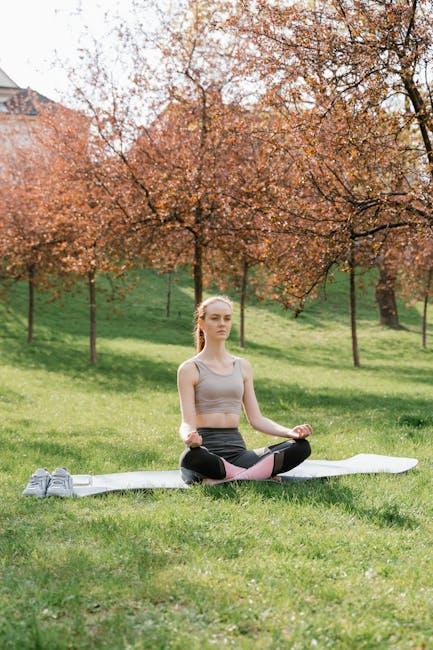In the frenetic dance of modern life, where deadlines blur into meetings and notifications chime incessantly, stress has become an unwelcome yet constant companion. It’s a shadow lurking in the corners of our daily routines, whispering of unfinished tasks and unmet expectations. Yet, amidst this cacophony, there lies a quiet refuge, an ancient practice steadily gaining modern momentum: mindfulness. Far from being a mere buzzword, mindfulness offers a sanctuary of calm and clarity, inviting us to pause, breathe, and reconnect with the present moment. This article delves into the transformative power of mindfulness, exploring how this practice can serve as a gentle yet potent antidote to the stress that so often dominates our days. Join us as we uncover practical techniques and insights to harness mindfulness, transforming everyday stress into opportunities for growth and tranquility.
Cultivating Awareness in the Present Moment
In the hustle and bustle of everyday life, finding moments of peace can seem elusive. Mindfulness, a practice rooted in ancient traditions, offers a pathway to tranquility by anchoring our attention to the present. By focusing on the here and now, we can gently redirect our minds away from the chaos and into a space of calm awareness. This practice can be integrated into daily routines, making it accessible to everyone.
- Breathe Deeply: Take a few minutes each day to focus solely on your breath. Notice the sensation of air filling your lungs and the rhythm of your breathing. This simple act can center your mind and reduce stress.
- Observe Your Surroundings: Engage with your environment by paying attention to the details around you. Whether it’s the rustle of leaves or the warmth of the sun, acknowledging these elements can ground you in the present.
- Practice Gratitude: At the end of each day, reflect on three things you are thankful for. This exercise shifts your focus from stressors to positive aspects of your life.
By cultivating these mindful habits, individuals can transform moments of stress into opportunities for growth and serenity. Through consistent practice, mindfulness not only enhances mental clarity but also fosters a deeper connection to the world around us.

Harnessing Breath as a Tool for Calm
In the hustle and bustle of daily life, it’s easy to feel overwhelmed by stress and anxiety. However, one of the most accessible and effective tools to combat these feelings is right under our noses—our breath. Mindful breathing involves focusing attention on the natural rhythm of inhalation and exhalation, allowing us to anchor ourselves in the present moment. This practice can be seamlessly integrated into any part of your day, providing a pocket of calm amidst chaos.
- Pause and Observe: Simply take a moment to notice your breath without trying to change it. This awareness itself can bring about a sense of tranquility.
- Deep Breathing: Inhale deeply through your nose, hold for a few seconds, and exhale slowly. This technique can slow your heart rate and promote relaxation.
- Box Breathing: Visualize a box as you breathe in for four counts, hold for four, exhale for four, and pause for another four. This structured method can enhance concentration and reduce stress.
These simple practices not only help in mitigating stress but also foster a deeper connection with our inner selves. By embracing the power of our breath, we unlock a natural remedy that brings clarity, balance, and peace to our daily lives.

Integrating Mindful Practices into Routine Tasks
Incorporating mindfulness into everyday activities is an art that transforms mundane tasks into opportunities for relaxation and presence. By embracing this practice, individuals can reduce stress and enhance their overall well-being. Consider these simple yet effective ways to infuse mindfulness into your daily routine:
- Mindful Eating: Turn meal times into a sensory experience. Focus on the texture, taste, and aroma of your food, savoring each bite. This not only aids digestion but also promotes a sense of gratitude and satisfaction.
- Conscious Commuting: Whether walking, driving, or using public transport, observe your surroundings. Notice the changing scenery, feel the rhythm of your breath, and be present in the journey rather than rushing to the destination.
- Intentional Breathing: During routine tasks like washing dishes or folding laundry, pause to take deep, intentional breaths. This simple act can anchor you in the moment and alleviate tension.
- Focused Listening: When engaging in conversations, listen actively without planning your response. This enhances connection and reduces misunderstandings, fostering healthier relationships.
By weaving these mindful practices into routine tasks, individuals can cultivate a more centered and serene approach to daily life. These small shifts in awareness can significantly reduce stress and bring a sense of calm and balance.

Embracing Self-Compassion to Alleviate Tension
In the pursuit of reducing stress, the practice of self-compassion becomes a gentle, yet powerful ally. Self-compassion involves treating ourselves with the same kindness and understanding we would offer to a dear friend. By acknowledging our imperfections without judgment, we create a space where stress can be managed with grace. When faced with daily challenges, remind yourself of these key principles:
- Mindful Awareness: Recognize and accept your emotions without suppression or exaggeration. This awareness allows you to respond to stress with clarity.
- Common Humanity: Understand that everyone experiences difficulties. Embrace the shared nature of human experience to foster connection rather than isolation.
- Self-Kindness: Offer yourself warmth and understanding during moments of tension. Replace harsh self-criticism with supportive inner dialogue.
By integrating self-compassion into your mindfulness practice, you nurture a balanced approach to stress that honors both your vulnerabilities and strengths.
The Way Forward
As we draw our exploration of mindfulness to a close, it’s essential to recognize that the journey to overcoming daily stress is as much about the path as it is about the destination. In the hustle and bustle of modern life, mindfulness offers a gentle pause, a moment to breathe, and a chance to reconnect with the present. It’s not about erasing stress but about understanding it, transforming it into a companion that walks beside us rather than a shadow that looms overhead. Whether it’s a mindful breath in the morning or a reflective pause in the evening, these small acts of presence weave a tapestry of resilience and calm. So, as you step back into the rhythm of your day, carry with you the knowledge that peace is not a distant shore but a wave you can ride with grace. Let mindfulness be the compass that guides you through the ever-changing seas of life, helping you to navigate with clarity, compassion, and courage.
